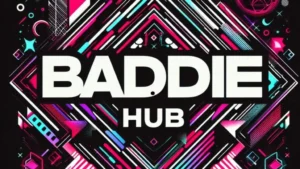
Introduction:
In today’s hyperconnected world, the internet has become a vast marketplace of ideas, entertainment, social networking, and more. Online platforms like BuddiesHub have sprung up to help people build communities, make friends, and foster interactions. These digital spaces, which often start with positive intentions, can also become venues for inappropriate or even harmful content. This leads us to discuss terms like “BuddiesHub Nude” or “buddies.hun.nude,” which suggest that some users may be searching for or expecting to find adult-oriented or explicit material connected to a platform meant for building friendships and communities.
This article will explore several aspects related to this keyword, from understanding the nature of online platforms like BuddiesHub to addressing the potential risks and privacy concerns associated with searching for explicit content online. We will also discuss the broader cultural and technological implications of such trends, including why it’s crucial for individuals to protect themselves in the digital age and how platform providers can take steps to moderate content and ensure user safety.
1: Understanding BuddiesHub and the Online Landscape
What is BuddiesHub?
BuddiesHub, as the name suggests, is most likely a platform designed for fostering connections and interactions among its users. It may function similarly to social media networks or online forums, allowing individuals to create profiles, connect with others, and form communities based on common interests. While such platforms are typically intended for benign purposes like building friendships, professional networking, or shared hobbies, they can sometimes become associated with adult content, either through misuse by certain users or through keyword associations like “BuddiesHub Nude.”
The Problem of Keyword Association
When we examine the phrase “BuddiesHub Nude” or “buddies.hun.nude,” it becomes apparent that this isn’t necessarily something endorsed or created by BuddiesHub itself. In many cases, search terms of this kind arise when users begin associating a platform with certain types of content—often explicit or inappropriate—that may not align with the platform’s intended purpose.
Several factors can contribute to the rise of such keyword associations:
1. User Behaviour: Certain users may be attempting to use the platform to share or request explicit content, leading to searches that combine the platform’s name with NSFW (Not Safe For Work) terms like “nude.”
2. Third-Party Influence: In some cases, external websites, domain squatters, or cyber exploiters may try to hijack a popular platform’s name for profit. They may create websites that include the platform’s name along with terms like “nude” in hopes of attracting users and redirecting them to adult or malicious content.
3. Platform Misuse: On some platforms, users might misuse the system by posting explicit or suggestive material, despite the platform’s rules and regulations. This can create associations between the platform’s name and such content over time.
Regardless of how these associations arise, it’s important to note that they can tarnish the reputation of a platform like BuddiesHub. Additionally, users need to be wary of potential risks, including exposure to inappropriate content, scams, or malicious websites when following these search terms.
Section 2: The Risks Associated with Searching for Explicit Content
The internet is full of material ranging from educational and entertaining to harmful and predatory. Searching for adult content or associating innocent platforms with such content can expose individuals to several risks, including privacy violations, scams, and cybersecurity threats.
1. Privacy Violations and Data Theft
When users search for keywords like “BuddiesHub Nude,” they may land on third-party websites or untrustworthy domains. These sites often collect personal data without consent, leading to privacy violations and, in some cases, identity theft. Users may unknowingly provide their information—either through registration forms or by allowing cookies on the site—that cybercriminals can exploit.
Many adult content websites are notorious for collecting and selling user data. In fact, users may have no idea their search history, preferences, or even email addresses are being shared with advertisers, data brokers, or worse, hackers. This becomes especially problematic when such searches are tied to otherwise legitimate platforms like BuddiesHub
2. Exposure to Malicious Software and Scams
Cybercriminals often exploit users who are searching for explicit content by luring them to malicious websites. These sites may look like legitimate extensions of platforms like BuddiesHub but are designed to trick users into clicking harmful links or downloading malware.
Common tactics include:
Phishing Scams: Some sites may ask users to input their personal information, posing as a login page for BuddiesHub or a similar platform. These phishing schemes can then steal sensitive information, such as passwords, email addresses, and even payment details.
Malware and Ransomware: Clicking on dubious links or downloading content from an untrustworthy site can infect a user’s device with malware or ransomware. These programs can lock users out of their own files, track their activities, or even demand a ransom to regain control over their devices.
Financial Fraud: In some cases, fake adult content sites may ask for credit card information under the guise of offering “premium” access or special content. Once this information is provided, scammers can make unauthorized purchases or commit financial fraud.
3. Misinformation and Harmful Content
Searches for terms like “BuddiesHub Nude” can lead users to sites that promote harmful, misleading, or illegal content. Many such sites feature unregulated or exploitative material, which can have serious emotional and psychological consequences for viewers, especially younger or vulnerable individuals.
This can also erode trust in otherwise reputable platforms like BuddiesHub, which may become unfairly associated with explicit or harmful content due to the actions of a few users or outside actors.
Section 3: The Importance of Digital Privacy and Responsible Online Behavior
Maintaining privacy and safe use of online platforms is more crucial than ever as the internet evolves.
Both users and platform providers must take steps to safeguard their digital presence and protect personal information from being exploited.
1.Best Practices for Users
When using platforms like BuddiesHub or browsing online, follow best practices to protect your privacy and ensure a safe experience.
Here are some tips for users to consider:
– **Avoid Here’s a condensed 25% version for SEO:
Avoid combining explicit terms with legitimate platform names. Stick to verified adult content sites and use strong, unique passwords with two-factor authentication to protect your accounts.. Two-factor authentication adds an extra layer of security to your accounts.
Review and update your privacy settings on platforms like BuddiesHub to control access to your profile and information. Share only what is necessary.
– **Watch Out for Scams and Phishing Attempts:** Never click on links or download attachments from untrustworthy sources. If a website looks suspicious or asks for more information than necessary, leave immediately.
– **Use a VPN and Secure Browser:** Virtual Private Networks (VPNs) can hide your IP address and encrypt your internet connection, making it harder for third parties to track your activity. Secure browsers with ad-blockers can also prevent unwanted tracking.
2. Responsibilities of Platform Providers
Platforms like BuddiesHub have a responsibility to ensure the safety and privacy of their users. Platforms should maintain clear terms of service, monitor content for violations, and implement measures to prevent harmful material sharing.
– **Content Moderation:** Regular monitoring and moderation of user-generated content are essential to prevent inappropriate material from being shared. Platforms can use automated algorithms to flag explicit content, combined with human oversight to ensure fairness and accuracy.
– **Reporting and Removal Systems:** Platforms should provide easy-to-use reporting tools for users to flag inappropriate content or behavior. Once flagged, administrators must act swiftly to investigate and remove harmful content.
Conclusion:
In today’s digital world, platforms like BuddiesHub are integral to our social and professional lives. Users should stay vigilant, practice safe online habits, and report inappropriate content. By taking preventive steps, users and providers can help build safer, more trustworthy online communities. Platforms must actively moderate content, enforce privacy standards, and educate users about the risks associated with adult content searches.



